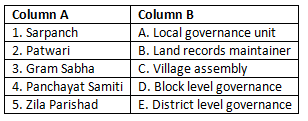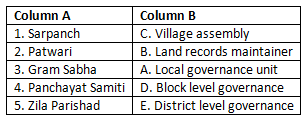Worksheet Solutions: Local Government in Rural Areas | Worksheets with Solutions for Class 6 PDF Download
| Table of contents |

|
| Multiple Choice Questions (MCQs) |

|
| Fill in the Blanks |

|
| True or False |

|
| Match the Following |

|
Multiple Choice Questions (MCQs)
Q1: What is the basic unit of local governance in India?
(a) Gram Sabha
(b) Panchayat
(c) Zila Parishad
(d) Panchayat Samiti
Ans: (b) Panchayat
Q2: Which of the following is a responsibility of the Panchayati Raj system?
(a) International Relations
(b) Road Maintenance
(c) National Defense
(d) Space Exploration
Ans: (b) Road Maintenance
Q3: The Sarpanch is elected by members of which body?
(a) Zila Parishad
(b) Gram Sabha
(c) Panchayat Samiti
(d) State Assembly
Ans: (b) Gram Sabha
Q4: Who assists the Gram Panchayat in administrative functions?
(a) Patwari
(b) Collector
(c) BDO
(d) Tehsildar
Ans: (a) Patwari
Q5: Which document discusses governance and administration from a historical perspective?
(a) The Constitution of India
(b) The ArthaShāstra
(c) The Ramayana
(d) The Vedas
Ans: (b) The ArthaShāstra
Fill in the Blanks
Q1: The Gram Panchayat operates at the __________ level.
Ans: village
Q2: The __________ is responsible for maintaining land records.
Ans: Patwari
Q3: Women are encouraged to participate in the Panchayati Raj system, with a reservation of __________ of seats for them.
Ans: one-third
Q4: The Panchayat Samiti connects the Gram Panchayat and the __________.
Ans: Zila Parishad
Q5: The Child-Friendly Panchayat Initiative involves children in __________.
Ans: governance
True or False
Q1: The Panchayati Raj system operates solely at the village level.
Ans: False
Q2: The Gram Sabha consists of elected representatives from the village.
Ans: False
Q3: The Sarpanch is the head of the Gram Panchayat.
Ans: True
Q4: The ArthaShāstra was written by Kautilya around 2300 years ago.
Ans: True
Q5: Only men can be members of the Gram Sabha.
Ans: False
Match the Following
 Ans:
Ans:
















